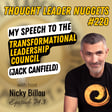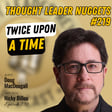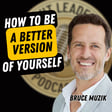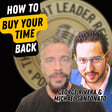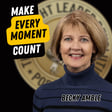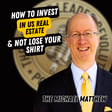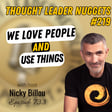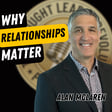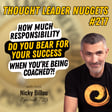Become a Creator today!Start creating today - Share your story with the world!
Start for free
00:00:00
00:00:01

EP241: Tom Dreesen - Success Secrets From Frank Sinatra’s Former Opening Act
If you possess something that you can’t give away then you don’t possess it, it possesses you.
That’s what this week’s guest learned from the legendary Frank Sinatra which he still practices today.
Tom Dreesen is a stand-up comedian, host, actor and has been in the show business for more than 50 years with over 500 appearances on national television.
He was known as Sinatra's opening act for over a decade.
Tom is also an author and has a new book called Still Standing...: My Journey from Streets and Saloons to the Stage, and Sinatra where we get a behind-the-scenes look into his life and groundbreaking entertainment career.
During this interview, you’ll learn…
- Why you need to start with yourself and take control of your mind
- The importance of having a commitment to your mission
- The significance of having a noble endeavour
To find out more about Tom, visit https://www.thethoughtleaderrevolution.com/.
Transcript
Lessons from Frank Sinatra
00:00:00
Speaker
And we get in the limo, and I said, Frank, that was beautiful. But why did you do that? He said, Tommy, if you possess something that you can't give away, then you don't possess it. It possesses you. And it's something I never forgot. He said later, he said, you know, Aristotle and masses had billions of dollars, private jets, private yachts. And the second he died, all that transferred.
00:00:23
Speaker
He was only using it. All the money transferred, his private jets, his private yachts, all of that transferred. So nothing we have is ours. We're only using it. And he not only talked that talk, he walked that talk.
Introducing Tom Dreesen
00:00:39
Speaker
Welcome to the Thought Leader Revolution with Nikki Ballou. Join the revolution. There's never been a better time in history to speak your truth, find your freedom, and make your fortune. Each week, we interview the world's top thought leaders and learn the secrets of how they built a six to seven-figure practice. This episode has been brought to you by eCircleAcademy.com, the proven system to add six to seven figures a year to your thought leader practice.
00:01:11
Speaker
Welcome to another exciting episode of the podcast, The Thought Leader Revolution. I'm your host, Nicky Baloo. And boy, do we have an amazing, exciting guest lined up for you today. This gentleman is an entertainer, a thought leader, a motivator, and just an all-round great human being.
00:01:32
Speaker
He spent 14 years in the entertainment field touring with the legendary Frank Sinatra. He has written inspirational books. He does motivational speaking. He truly is a gem, and we are so excited to have him here on the show today. I am speaking, of course, of none other than the one, the only, the legendary Tom Dreesen. Welcome to the show, Tom.
00:01:57
Speaker
Thank you, Nikki. That was a great introduction. It's hard to follow that, but I'm going to do the best I can. God bless your heart, man. God bless your heart. So, Tom, you know, I found out about you when I was watching some clips on YouTube about about Frank Sinatra. And there was one where you were being interviewed and you were talking about some of the things that Frank taught you. And one of the stories you told was that if someone ever
00:02:28
Speaker
was hanging around with Frank and they said, hey Frank, I really like your shirt. I really like those cufflinks. I really like your watch. He would just take them off and he would hand them to people and that just blew me away. And I watched that clip
00:02:45
Speaker
And I listened to what you learned from this man, and you got a whole bunch of other anecdotes that you give that have blown me away. And then I found out that you've written your own book called Still Standing, and you do motivational speaking. And I thought, wow, I need to bring this man on the show.
Tom Dreesen's Backstory
00:02:59
Speaker
He's a wealth of information. So thank you so much for agreeing to be our guest on the show today. And listen, people who listen to this show, these are
00:03:10
Speaker
entrepreneurs. These are people who have a desire to make a difference in the world because they've got a dream and they take it out there and they bring their product, their service out into the world. They help make the world a better place. They listen to the show because they want to be inspired by you as our guest expert and they want to learn from you so that they can take that inspiration, they can take those learnings out into the world and do what they do better and serve people at a higher level and of course succeed at a higher level as well.
00:03:39
Speaker
But before they can truly open their hearts to you, they need to get to know you. They need to know who you are. So tell us your backstory. How did you get to become the great Tom Drayston? I'm humbled by that part, but it all began.
00:03:58
Speaker
I grew up in a suburb on the south side of Chicago called Harvey, Illinois. It's 147 South. It's a steel mill town in those factories. They made everything from clutch plates to the crankshafts. It was a thriving little metropolis when I was growing up, but I grew up very poor. I lived on the other side of a factory. We lived in a shack. There were eight children, four boys and four girls. I was the third.
00:04:22
Speaker
And so as a little boy, you know, you know, we were raggedy poor. It holds in our shoes. If you had holding shoes, you put cardboard in it. If a window broke, you stuck a rag in it, you know. It was a sometimes rat infested, rote infested shack. We had no bathtub and no shower and no hot water. And it wasn't during the Depression. I'm not that old, but those were hard times. So I grew up in a neighborhood where the mantra was you only deserve in life what you work for.
00:04:50
Speaker
And so at age eight, I had a shoeshine box and I was going around all the taverns in my neighborhood. Harvey had 36 taverns in all, there were eight in my neighborhood. And I would try and choose in all the taverns, you know, trying to make enough money to help feed my brothers and sisters. I also
00:05:08
Speaker
You know, later I said, Vincent, bowling alley, I caddied in the summertime, I sold newspapers, I had a paper route, and I shined shoes, you know, all too healthy, my brothers and sisters. And none of this do I regret. I say that's the greatest thing that ever happened to me. You know, I'm a stand-up comedian first, last, and always. That's who I am. But I give motivation talks because it's a passion of mine. I've read literally hundreds of books on the powers of the mind.
00:05:33
Speaker
And I'd use those sciences to come from where I came from to where I'm at today. And one of the stories I tell when I tell any group I'm talking to, any corporation or at university classes and stuff, I tell them this story of how far I
Comedy Career Journey
00:05:54
Speaker
grew up. And I tell them that's the greatest thing that ever happened to me. And I mean that because all of life is about perception.
00:06:02
Speaker
My motivation talk has four subjects, perception, visualization, self-talk, and develop a sense of humor. And I elaborate on each one of those points.
00:06:13
Speaker
And so I perceive that my childhood was a blessing because it helped develop the character. And also, no matter the title of my book is still standing, which is a double entendre, because I'm still a standup comedian. This is my 51st year in children as a standup comedian. But I'm also still standing here as I've been knocked down a lot in my life. And if you read my book, my recent book, I was knocked down physically. But I keep getting back up.
00:06:40
Speaker
And so that's the backstory. From there, growing up that poor, I ended up being a high school dropout at age 16 because I was embarrassed the way I was going to school with holes in my shoes. And in high school, that's kind of tough, because all the kids are trying to dress to the nines. At age 16, I dropped out of high school. At age 17, I went to the Navy. And I got a high school diploma from the Navy. When I came out of the Navy, I went to junior college nights.
00:07:07
Speaker
and did some studying there. And then later joined a civic group called the JC's. In those days, a young man of action, ages 18 to 36, a lot of leadership training programs, teaching you how to serve on the committee, how to chair a committee, but mainly tackling the problems of the unity you lived in. The JC's were in 50 states and in 22 foreign countries.
00:07:30
Speaker
And any problems in your community, these young men attacked those problems and tried to solve those problems through community programming. And while in the J.C., one of the biggest problems in our community at that time, and hardly as the world, and it is today, were are young people using drugs. So it was becoming a real serious problem. So I wrote a program teaching grade school children the ills of drug abuse with humor. It's a concept I had.
00:07:59
Speaker
because they weren't teaching drug education in those days at a college level or high school level, let alone at an elementary school level. So I wrote the program and it had a lot to do with making the kids laugh and then planting the seeds of the ills of drug abuse. Working with me on this project was a young black man who just graduated from Norfolk State College in Norfolk, Virginia, and E.I. DuPont recruited him into Chicago as a marketing rep. His first day of joining the chapter
00:08:28
Speaker
He came up after I presented this project to the J.C. He came up and said, I would like to work with you on that project. And as fate would have it, I already had a guy, you know, helping me. But the next day, my friend that was supposed to help me, it was a white guy named John DeBoer. He said, I can't help you with that project. I got a new job. I said, gee, what was that black guy's name? Oh, yeah, Tim Reed.
00:08:49
Speaker
So I called him and Tim and I worked on the project. We rehearsed it. We went in the classrooms and the program became a huge success. JC's used it as a model program throughout their publications on how to teach drug education at an elementary school level. So we were making the kids laugh, playing records and all that. And then we'd plant the seeds of the ills of drug abuse. And one day a little eighth grade girl walking out of the classroom said, you guys are so funny. You ought to become a comedy team.
00:09:17
Speaker
And the thought of a black-white comedy team intrigued us because no one had ever done that before. So we became America's first black and white comedy team. And there were no comedy clubs in those days. So we worked all black clubs in the North and the South, affectionately called the Chitlin Circuit. Black-owned, black-operated nightclubs. And we worked all white nightclubs, too.
00:09:36
Speaker
and eventually on the Playboy circuit. We stayed together for six years. Tim wanted to be more of an actor. The team stood up. Tim went on to become Venus slide trap on WKRP Cincinnati. Wow. That's so cool man. He also was on a show called French Place and Simon and Simon and a current show was called Sister Sister. Anyhow, and he's still acting and directing till this day. The team stood up.
00:10:06
Speaker
And in fact, we wrote a book about our life, Tim and Tom and American Comedy and Black and White, which may become a series now, a Netflix series. But from there, I went on my own and then I ended up on the West Coast struggling. I had a wife and three kids. My wife wanted me out of show business. She hated show business and wanted me out. I ended up on the West Coast, you know, comedy. So because in those days, everybody came out to the West Coast because Johnny Carson had moved out of New York into
00:10:35
Speaker
California and the the in one appearance on the financial your whole life changed Freddie Princeton one appearance on the financial got a sit-down the next day I ended up on the west coast Ended up going to hardships trying to get out of the comedy store till finally I was sleeping in an old car an abandoned car It wasn't my car It was a Nash rounder that was up on blocks and the front seat came down and I stayed in that car almost a month hitchhiking up and down Sunset Boulevard begging to work for free
00:11:05
Speaker
every night at the comedy store. And finally got on and then worked my way into the system, became a regular, kept hustling to come and get me, come and see me. And finally that they did come and see me, I auditioned with a new kid that night named Billy Crystal. I don't know whatever happened to him, but I'm with Mickey.
00:11:25
Speaker
So I finally get my first tonight show and I got bumped three times, but I finally got on the night I got on. It was a hot audience. I got eight applause when I went back through the curtain. Johnny called me back out for another bow and I took another bow and I never stopped working from that day forward. I did 61 appearances on the tonight show to this date.
00:11:46
Speaker
and over 50 I'm Letterman and I even hosted Letterman, all those kind of things. But that led me to touring with, during the Tonight Show, also all the other shows were after me at that time. The Dinah Shore, Merv Griffin, Mike Douglas, Johnny Carson, Midnight Special, Rock Concert, Soul Train, American Bandstand. I'm the only white comedian ever to do Soul Train. But then other artists who saw me on TV, they wanted me to open for them or work with them because people like
00:12:16
Speaker
Sammy Davis, Jr., of course. And then other artists, Smokey Robinson and Mac Davis and Tony Orlando and Don and Frankie Avalon and James Demond and all these kind of artists, Natalie Cole, Gladys Knight and the Pips, because they had family audiences and they were clean. So they needed someone who would not, you know, what we call blue.
00:12:37
Speaker
So all of that, touring with Sammy Davis, all that. And then it led me to opening for Frank Sinatra, which by being glib at the right time, I said something very funny to his lawyer, and they ended up putting me with Frank Sinatra. And that turned into 14 years and 45, 50 cities a year.
00:12:56
Speaker
And throughout those years, all the hardships, I applied those sciences, perception, visualization, whatever the mind can see and believe it will achieve, you know, perception, 90% of what happens to you, you know, it's 10% of what happens to you, but 90% how you view that, you know, and I would always view everything as an opportunity.
00:13:22
Speaker
And finally, in visualization and in self-talk, the most
Frank Sinatra's Legacy
00:13:26
Speaker
important person you'll ever talk to is yourself. So I kept myself motivated and then finally developed a sense of humor. And that sense of humor is not when you have the ability to laugh at other shortcomings or misfortunes, it's when you have the ability to laugh at your own and that will keep you healthy. So that brings me to your show.
00:13:49
Speaker
I gotta tell you, you've got a heck of a story. I had no idea that you worked with the great Tim Reed. I loved WKRP in Cincinnati and I loved Tim Reed. He was great as Venus Flytrap. He was really good in Simon and Simon as a detective. I forget the name of his character, but just a- Downtown Brown. Downtown Brown, that's right. Brilliant, brilliant, brilliant man. Very funny, but he could also handle himself in non-comedic roles too. And when I was growing up,
00:14:18
Speaker
I wanted to be like Venus Flytrap. I wanted to be cool like Venus Flytrap.
00:14:24
Speaker
That's awesome. Yeah, we're the best of friends today. America wasn't ready for us. You know, they weren't ready for the first black and white comedy team. And the show that they weren't ready, that was 45 years ago, and there's still never been another black, white comedy team since then. So they weren't ready for us, but we were ready for them, you know, and we did material in those days that today they'd run us out of town on a rail, but politically correct police would try to destroy us.
00:14:50
Speaker
But we didn't care then, we don't care now. Yeah, God bless you, man. God bless you both. That's fantastic. And you were in Vegas, you got to meet Billy Crystal, and you got to tour with Frank Sinatra for 14 years. I mean, young people today have no idea what a huge star Frank Sinatra was. I mean, he was a global megastar.
00:15:32
Speaker
There were over 1,200 original songs that he introduced, specifically written for him, that he introduced. But even if you forget about that, he ended up in film and dance with Gene Kelly. He won the Academy Award. He never took an acting lesson. I was sitting with him one night at his compound with Gregory Peck, Kirk Douglas, Clint Eastwood, Jack Lennon, Robert Wagner, and they were talking about film and all those things.
00:15:39
Speaker
Right? This guy.
00:16:00
Speaker
And I noticed the reverence they were showing to Frank. And so I was curious, because everybody always wants to tell you who they studied with, you know, I studied with Stella Adler or, you know, some, some name like that. And so I was curious who Frank studied with. And I said, did you study acting in Gregory Peck? I grabbed my arm.
00:16:17
Speaker
And he said, acting lessons would have ruined him. He was a diamond in the rough you didn't fool with. That's a malignant actor like Gregory Peck. Forget about that Frank won the Academy Award and the man with the golden arm. What about the, I'm sorry, compared to eternity, he won the Academy Award. But he should have won it and the man with the golden arm.
00:16:37
Speaker
And what about a movie called The Manchurian Candidate that Ron Lyons expressed? He was a brilliant actor. That was a great movie. The original Manchurian Candidate? That was a brilliant movie, ahead of its time by at least 30 years. No question about it. But the point I'm making here, if you gave Frank Sinatra a song to him, it was a script.
00:16:57
Speaker
What did the writer feel the night the writer took him in hand? Frank would immerse himself in the lyric and become that lonely guy in the bar which woman left him. And he's never going to find love again. And you felt that. You felt every emotion. He was the greatest interpreter of lyrics of our time.
Sinatra and Racial Equality
00:17:12
Speaker
And this music will live on and on and on. A singer of love songs is a singer of love songs.
00:17:18
Speaker
But he's saying, the joy of songs, the heartache of songs and the joy of songs, you felt it all. He truly was the first of his kind and he's also the last of his kind.
00:17:29
Speaker
Yeah, you're 100% correct. My mother and father were such huge Frank Sinatra fans. My mother had an opportunity to see him in concert here in Toronto, and she went, she saw him, she came back, she was transported, she was like a little girl again, you know, teenage girl, and she said, oh, he was only there for 45 minutes, but he was so amazing, he was magnificent. She was like, you know, in that moment, my mother was a good Christian woman,
00:17:54
Speaker
And faithful and loyal, I just thought if Frank had just beckoned to her, she would have run away and left my father and the kids. I mean, I'm joking, of course, but that was the impact that this man had on people.
00:18:08
Speaker
He was ahead of his time back in the day. Here he was, this Italian-American kid from New Jersey, and he started touring the South. And back in those days, the South was pretty segregated, right? And this ticked him off. I mean, it bothered him to the core of his soul.
00:18:26
Speaker
And he went, and he went out of his way to tick off the racists, basically, and say, hey, if you want me here at your venue, you're going to have to let them here. I remember when you mentioned, I think, on one of the videos that he went to Vegas, and in Vegas, they would allow the Black singers
00:18:50
Speaker
and musicians to play at the big venues, but they wouldn't allow them to stay at the big venues. That was insane, right? They would force them to go to what they called the colored section of town, a horrible thing to say, and they would force them to stay in hotels there that were not nearly as nice.
00:19:09
Speaker
And Frank went to one of the big hotels, and he basically said, they're staying here or I'm leaving. Like, I'm leaving. I'm not saying, you know, I'm leaving. And I'm going, wow, that must have taken guts back then in the 60s. I mean, unlike today where everybody, of course, is virtue signaling that they're against racism and in favor of equal rights, where there's zero risk to doing that because the whole world has embraced that position right now. Back then, that was a real risk for the man to do that, wasn't it?
00:19:36
Speaker
Yeah, and also he won the Academy Award for a film, a short film he did called The House I Live In, and it was all about prejudice. And yeah, he was at the forefront of all that. Sammy Davis Jr. said many times, I toured with Sammy for three years before I toured with Frank, and Sammy many times told me stories about how Frank
00:19:58
Speaker
It would do things like that. As a matter of fact, the first time he met Frank, Frank was working at a theater in New York.
00:20:08
Speaker
And going through a tough time, but he's working at a theater in New York, and he went down to Harlem and saw the Willmaston Trio featuring Sammy Davis Jr. And he was blown away by Sammy, so he went backstage afterward. And Sammy told me his story. He said that Frank came back and told him how much he enjoyed his performance. And he said, I want you to come and see me. And Sammy was blown away. He said, you know, come and see my show, you know, tell me my story. So long story short,
00:20:33
Speaker
but a week and a half goes by and Frank goes back down to Harlem to see the show again. And he goes backstage afterward and he tells Sammy, I'm angry with you. And Sammy said, why? He said, I've seen your show twice now and you've not come to see me once. He said, Frank, I went to see you, they wouldn't let me in. He went back to the theater, walked into the manager's office and ripped his contact up and through in his face and said, sue me, I'll never work here again. And he walked out.
00:21:03
Speaker
And of course, that was Sammy's story. And they, of course, remained friends, you know, all their lives.
The Art of Clean Comedy
00:21:11
Speaker
I went to Sammy's funeral with Frank, you know, and Dean, Frank, and I went there with both of them. You know, it was a moving moment. You know, Sammy taught me so much about children. He was such an extraordinary performer. There was
00:21:27
Speaker
nothing he couldn't do on a stage. He went on stage when he was two and a half years old with his dad and his uncle, the wool mask and trio. He could sing as good as anybody out there. Frank would say, I never heard Sammy hit a clinker. He said, I hit a clinker once in a while, but Sammy would never hit a clinker in the note. He could sing as good as anybody out there. He could dance better than anybody out there. He could do comedy as good as any comedian I met. He could do impressions better than any impressionist I've ever seen. He could play the trumpet. He could play the piano. He could play the drums.
00:21:57
Speaker
He was a parade out there, you know. And I would sit in the wings every night when I was turning with him, sit in the wings and watch him just take command of that stage. It was like going to school of show business. And the same way with Frank, you know, usually when I talk with Frank and even Dean. And I worked with Dean many times. I did the Dean Martin Roast and I did some corporate dates with Dean. These are old-time pros.
00:22:19
Speaker
Today, your stars and your singers and your entertainers use a lot of mechanical stuff like laser lights to create excitement in an audience. They use different lighting techniques. Sammy Davis Jr. was a laser light, so was Frank. They walk out on stage.
00:22:39
Speaker
to watch Sammy walk out on the stage and just create the magic that he could do was incredible. Frank as well, nothing I like better than watch Frank walk out to the microphone. He created more excitement walking to the microphone than most people do with their whole act. I can't tell you how many arenas I did with Frank where there were 20,000 sold out people in Hawaii when 40,000 people were outdoors.
00:23:07
Speaker
and him walking out to the microphone, the place with electricity would go through that crowd and they would cheer and cheer and cheer. It was really amazing to watch.
00:23:17
Speaker
Yeah, that's spectacular. I love Sammy Davis Jr. too. His voice was like an angel's voice. Just a brilliant, brilliant guy. And he was very funny. I really, really enjoyed watching him do his comedy shtick when he did it. The Dean Martin Celebrity Roasts are a lot of fun. I get to watch a bunch of them on YouTube. I saw the one
00:23:39
Speaker
where they roasted then-Governor Reagan. I saw the one where they roasted Muhammad Ali. I thought that was pretty funny. And I watched clips from a whole bunch of them, spectacular, spectacular stuff. And Sammy was at a lot of them, and he really did a great job, really, really did a great job. And they kept it clean that they made you laugh. And that
00:24:02
Speaker
That's the part that I'm blown away by more than anything, because I don't know of any modern comedians that keep it clean. You know, and I don't mind a body blue joke once in a while, but it's also nice that you can take your kids to something and it can be clean and still be funny. Well, you know, I'll tell you a funny story. A while back, I was, I traveled new material at the laugh factory in Hollywood. Whenever I come up the road, I go right to the laugh factory and I get up on stage and travel new material.
00:24:30
Speaker
And I was there a while back, and I was upstairs waiting to go on. And there were two young comedians around the
Life Lessons from Sinatra
00:24:36
Speaker
corner, and they didn't know I was there. And I didn't know they were there. And one of them started talking, and he said, you know, Tom Theresa is here. And so my ears perked up, you know. And the other guy said, oh, yeah, he's old school. And the other young comedian said, he's old school. What do you mean? He said, well, he doesn't use the F word. And the other comedian said, he doesn't use the F word. What does he use for adjectives?
00:24:57
Speaker
And I stuck my head around the corner and I said adjectives. That's what I use for adjectives. See, that's the problem. You can use it as a noun, a pronoun, an adjective, an adverb. And whenever you're not creative enough, you throw that in there for effect. But in comedy, once you use an adjective,
00:25:23
Speaker
over and over, it loses its effect, you know, and after a while that loses its effect. It's far, I tell young comedians all the time, when I give motivation talks to young comedians, I do that around the country, I call it the joy of stand-up comedy and how to get there, because there's so many great comedians who never enjoy this journey
00:25:46
Speaker
this wonderful journey they're on of bringing help to an audience, you know, bringing laughter. But I tell them all the time, I say, write your first hour clean.
00:25:56
Speaker
write it so grandma and grandpa, mom and dad and the kids can laugh at it. Then if you want to go blue with in children's we call working with vowel language or sexual innuendos working blue, I said you know write your first hour clean, challenge yourself, write your first hour clean and then if you don't want to go that way then you know go blue but at least challenge yourself to write that kind of material.
00:26:25
Speaker
Yeah, it takes more raw talent to do it clean than it does to do it blue. Because if you do it clean, you've got to come up with stuff that's actually genuinely funny and isn't relying on shock value. And that's why I admire the work you do so much.
00:26:46
Speaker
Tom, share some of the lessons that Frank taught you because I love those. Please share a couple of those with us. Well, commitment to the mission, you know, more than you got from Frank Sinatra, you want to party with Frank? Frank will party with you all night long. You know, he stayed up till dawn. He never went to bed till the sun came up.
00:27:07
Speaker
But show time, everybody better know their job because he knew his and he made sure that he put the best around him, the best arrangers, the best musicians. I like to paint the best comedians, but the show was important.
Reflections on 'Still Standing'
00:27:22
Speaker
You don't slop off the show. I once said to him, why do we wear tuxedos, Frank? He said, Tommy, if we were going to do a show for the king and the queen,
00:27:31
Speaker
Would we not wear, you know, for royalty? Would we not wear a tuxedo? I said, well, yeah, sure. He said, well, that garage mechanic in Detroit and his waitress wife who worked all year long to save enough money to buy two tickets to our show, they're just as much royalty as the king and the queen. And they deserve the same kind of show that we would give royalty.
00:27:52
Speaker
So that's one thing he taught me about the show. Be prepared for the show because he was and he wanted everybody to do their job. But so many other things, personal things in life was his loyalty to his friends and his family, with his deep loyalty to his friends and his family. Also his kindness. I always tell this story
00:28:18
Speaker
one that I think you saw on the internet. We were coming out of the Waldorf Astoria one night on our way to do a show. We went out the back entrance because Frank couldn't walk the front, he'd be mobbed. So we're going out the back. He had an apartment in the back. And so the security was rushing us to the limousine in the back. And a woman jumped out of the doorway. She'd been hiding there for like five hours. The bellman told me later on.
00:28:40
Speaker
And as we were rushing to the limo, she jumped out and she said, screaming, Mr. Sinatra, please, Mr. Sinatra, please. And she was rushing and told him in the spirit, he held her back. He was getting in the limo and she kept humming, please, Mr. Sinatra. And finally he turned around and he walked back. He said, what is it, ma'am?
00:28:56
Speaker
She said, could you send an autograph to my husband? He's home sick. He's very, very, very, very ill. And your autograph would mean the world to him. And Frank said, sure. And he sent me the autograph and she said, oh, with beautiful cufflinks. And there were a couple thousand dollar cufflinks. I know where he got them. It's a long story, but very, very expensive cufflinks.
00:29:16
Speaker
She said, what beautiful cufflinks. She said, thank you very much. And he finished the autograph and he took the cufflinks off and he gave them to her and said, give these to your husband. She said, oh, no, no, no, no, I don't, I don't want them. I was just admiring them. He said, oh, I want your husband to have them. And we get in the limo and I said, Frank, that was beautiful. But why did you do that? He said, tell me, if you possess something that you can't give away and you don't possess it, it possesses you.
00:29:40
Speaker
And it's something I never forgot. He said later, he said, you know, Aristotle and masses had billions of dollars, private jets, private jets. And the second he died, all that transferred.
00:29:53
Speaker
He was only using it. All the money transferred, his private jets, his private yachts, all of that transferred. So nothing we have is ours. We're only using it. And he not only talked that talk, he walked that talk. His friends had to be very careful around him. You couldn't say, oh, with a beautiful watch, he'd take it off and give it to you. You couldn't say, isn't it a beautiful painting? He'd take it off the wall and give it to you. I remember a funny story. One time he hit a golf tournament that I performed at every year.
00:30:23
Speaker
It was off a charity that went to the Barberson After Children Center in Rancho Mirage, which is a state-of-the-art children's center for physically, emotionally, and sexually abused children, and no child is turned away. And so Frank, that was his favorite charity. So every year, he once said to me, Tom, I'm going to do a golf tournament. I'd like for you. We were on this jet flying in from a gig in New Orleans.
00:30:46
Speaker
We were coming over the mountain to the desert and he said, Tom, I'm going to do a golf tournament. I'd like for you to help me with it. I want you to stand up and I'll sing. I thought it was one year. I said sure. It turned into 30 years and we did it. But my point was,
00:31:04
Speaker
one year, he gave away a Rolls Royce for a hole in one. You know, if you get a hole in one in this one hole, you would get Frank Sinatra's Rolls Royce. So anyhow, I hit an iron into the green that it rolled up on the green and the gallery all around the green said screaming and jumping up and down. And I thought it went in. And when we got up there, it was like a half an inch more. It would have fallen in the cup. It was on the lip. It didn't go in. You know, after the round of golf, I go back to the house and all the house guests were there.
00:31:35
Speaker
They were having lunch and talking. I came in and we said, hey, Tommy, how did you play? I said, Frank, you ain't going to believe this. You're not going to believe it. I almost won the Rolls Royce. It was like a half an inch. I almost won it, but we almost went in. He said, take it. Take it. He said, that's why I donated. Now, all the guests looked at me like, oh, man, you just worked on him. And I said, no, no, no, no, I don't want it. No, no, no, I want to earn it. But he meant it. He meant take it. That's why he donated. He said, you don't want it anymore.
00:32:03
Speaker
But I, of course, should not do that. Well, you're a man of honor, and so is he. My God, that's incredible. That's incredible. So, Tom, you're a comedian. You're also an author and a motivational speaker. And talk to us about your book.
00:32:23
Speaker
The book is called Still Standing, you know, My Journey from Streets and Sonatas to the Stage and Sonata, which can be gotten on Amazon.com. And in fact, they'll get it to your house in two days. They're amazing. But it's basically what I told you, a little boy, it's a little boy, eight years old, dragging the shoe shine box through the snow in and out of taverns, shining shoes to make money to feed his brothers and sisters. And now every jukebox, shining sonatas on the jukeboxes and all the bars in my neighborhood.
00:32:51
Speaker
And that little boy, the end of that book is that little boy is carrying Frank Sinatra's coffin out of the church in Beverly Hills, California. You know, from Harvey, Illinois to Hollywood. You know, and all the things that happened in between that little boy's shining shoes and the way to carrying Frank Sinatra's coffin out of the church in Beverly Hills, where I also spoke as you know.
The Power of Laughter
00:33:13
Speaker
So, it's all the hard knocks, you know, the growing up poor and, you know, struggling through show business, struggling four years in the military, telling them the service had a wife and three kids and, you know, going from job to job. Never finding what it is I wanted. I never felt fulfilled. I was praying at that time saying, please God, what is it I'm supposed to be doing? This can't be it. Sometimes I'd be in a bar with my buddies looking around the bar at one o'clock in the morning. I'd say, I don't belong here, but I didn't know where I belong.
00:33:42
Speaker
So I would pray, you know, and of course then came along to J.C. and meeting Tim Reed and my whole life changed, you know. So the book is about that, all about the rejection to receive and show that it's a hard time, but how I overcame those rejections and why I overcame those rejections. You know, when I first went on stage with Tim Reed,
00:34:06
Speaker
Again, I was wandering aimlessly, didn't know what I wanted to do in life. Something I had written that very first night got a laugh when we went out on that stage. And it was like an epiphany, like an old B movie where the dark clouds open up and the sun bursts through. And my whole being went, oh, yes, oh, this is what I want to do. I knew hearing that laughter, this is what I wanted to do. Now that was a Friday night.
00:34:31
Speaker
I couldn't sleep that night. I tossed and turned all night long. I got up Saturday morning and I went down to the church that I had thought was an altar boy. And when I was a little boy, you know, I received my first communion and confirmation where I sang in the choir where my mother sang in the choir when she was a little girl.
00:34:49
Speaker
And it was a Saturday morning. There was no service. I was the only one in the church and I knelt down and I prayed. I said, God, I now know what I want to do. I found it. Thank you for leading me to it. I want to be a comedian. If you let me make my living as a standard comedian, I'll never ask for anything else. I'll do charity work. And I was making all these promises. The thought that you can make a living, making people laugh overwhelmed me. And that was 51 years ago. All my dreams have come true. All my prayers were answered.
00:35:17
Speaker
And September 1969 was when I knelt and prayed in that empty church. September 2019, 50 years later, I went back to that church and gave a sermon on Sunday on the power of prayer. And I told the audience, I knelt right over there and asked for what has become a reality in my life. And it's not rocket science. I said to the audience, I said, how many of you out there were thinking of somebody?
00:35:45
Speaker
you know, and somebody hadn't seen in years and the phone rings and it's that person. Or if you were thinking about someone, they hadn't seen you, you're walking down the street, you turn the corner and you run right into that person and you go, I was just thinking of you.
Advising on Mindset and Resilience
00:35:56
Speaker
And I said, raise your hand. The whole congregation raised their hand. I said, so if we human beings can transfer thought, and we can, we just raised our hands to prove that we can, then how much thought can be transferred from a supreme being
00:36:12
Speaker
You know, if we human beings can make that thought transfer. So that's what prayers are. You're praying to that Supreme Being who hears those prayers.
00:36:23
Speaker
Amen. Amen. That's brilliant. You know, this sounds like a fabulous book. I'm going to order it from Amazon. I'm going to check it out. It's incredible, Tom, how you've got this multivariate career. You've been there with the biggest star in the history of show business, Frank Sinatra, for 14 years.
00:36:42
Speaker
You toured with the great Tim Reed. You got a fantastic comedic career of your own. You've written books. You do motivational speaking. God bless your heart, man. It's absolutely fantastic that someone like you exists. It gives someone like me
00:37:01
Speaker
hope and belief that it's possible for me to be a multi-talented guy because I do a lot of different things. And I've always wanted to be able to express myself in multiple ways. I love doing these podcasts. I love writing books. I love speaking. I love doing business deals. I'm working with a good friend of mine. We're writing a script together. And I want to believe that it's possible to do all these things and express myself fully. And your example gives me hope that it is possible for me, number one. And number two,
00:37:31
Speaker
You're just a good human being. It just comes through in the way you tell your stories and the way you comport yourself. So it's been a real pleasure and a real honor to have you here on the show, my friend. I'm really, really thrilled that you decided to come and grace us with your presence today. Well, thank you. Thank you for having me, Nicky. I really appreciate that. Promise me, after you read the book, you'll tell me what you think. I really enjoyed that. Service to humanity is the best work of life.
00:38:00
Speaker
You know, what you do for a living makes people better off for having had your services.
00:38:07
Speaker
then you're in the right profession. If what you do, people for having your service are better off. And that's what motivation talking is. That's what comedy. Laughter is healing. It's no longer a theory. They've always known that laughter is psychologically a deterrent because the brain can't think of two thoughts at the same time. It can't hold two thoughts at the same time. So if you're laughing at a comedian or laughing at a show, you're not thinking about your problems. So it's a psychological deterrent.
00:38:36
Speaker
But now, because of a man named Norman Cousins, who was the editor of Saturday Review, he had a terminal illness, and he was told that he was going to die. The doctors told him he was in the hospital because of all the stress in his life. It now was part of a heart ailment he had, and he didn't have long to live. He laid in the hospital, and he thought negative input made me ill.
00:38:57
Speaker
stress and positive input should make me well. So he checked out of the hospital and he would no longer watch the news. He'd only watch I Love Lucy. He'd rerun the Candid Candler, Three Stooges, The Marx Brothers. He'd listen to comedy albums, watch Comedians. And he lived 27 years after the doctors told him he was going to die. Because of that, UCLA did research on what happens to the human body when you're laughing. And they found that when you're laughing, you have a hearty laugh or, you know, tears run down your eyes. And at the end of the laugh, you go,
00:39:24
Speaker
the sense of well-being comes over you it's because your body's going to an actual chemical change that endorphins are released from the brain into the bloodstream so laughter is not only psychologically the turn it's physiologically therapeutic therefore comedians are physicians of the soul so you can call me doctor dresham if you want to.
00:39:43
Speaker
I love it. I love it, Dr. Tricia. That's a fantastic story. I've actually read Norman Cousins' book, Anatomy of an Illness. It was one of the first books I read when I began my journey of personal development. One of my mentors, Janet Kramer, is the person who recommended it to me, and I love that book. It's a very inspiring book. It's important to laugh every day. It's one of the reasons I go on YouTube and I watch funny clips. So, Tom,
00:40:10
Speaker
We like to end off each and every one of our episodes by asking you as our guest expert to give us your top three, what I call expert action steps. Basically, these are your best three pieces of advice that you want my listener to take on to take his life, her life, his business, her business to the next level. So if you were to say them succinctly in bullet point form, what would they be?
00:40:35
Speaker
Well, there's so many that raised in my mind, but I'd probably say, first of all, start with you. Change your thinking. Take command of your mind. Take command of your mind. You can control the thoughts that enter your mind. Negative thoughts are always flowing in the universe in your mind, but we don't have to harbor them.
00:40:54
Speaker
I always say your mind is like a garden and plant flowers. That's positive thoughts. Now, if while you're planting flowers, weeds grow, would you let the weeds grow? No, you dig the weeds out and we plant flowers. So, you know, if you can change, we have the freedom to think any thought or string of thoughts. You know, therefore it follows that we determine how we feel. What a gigantic concept, you know, that
00:41:18
Speaker
This is the universe you are given, this body. And this is the universe you are given. You can control what comes in and out of your brain. In my classroom, sometimes I'll take a glass of water and I'll pour dirt in it. And I stir it up and I say, drink this. And no one would drink it. I said, if you won't drink dirt, why would you drink dirt? And just being filled in your mouth.
00:41:36
Speaker
You know, you won't do that. Why would you ingest soap in your brain? So if a negative thought comes in and you can't grab it, throw it out and replace it with a positive thought. You know, I always say by the end of my motivation talk, I'm going to tell you what the secret is. But in the end, I say, here's the secret. The secret is you. You're the secret. I would tell them second of all, search your life. You know, if what you want to do, if it's a noble endeavor,
00:42:01
Speaker
And what you're embarking on, Nicki, is a noble endeavor. So search your life and see if there's anything in your life that can deter you from that noble achievement. And if there is, throw it out. You know, man, woman, or beast. You know, in my case, I used to love drinking beer. I love drinking beer with the guys and hanging with the guys. But one night, I will.
00:42:20
Speaker
that that could fog my brain. I wake up every morning with hangovers and stuff like that and trying to be creative and right. I realized that that wouldn't work. So I threw that out of my life. So if there's anything in your life, if what you're pursuing is a noble endeavor, search your life and see if there's anything that can deter you from that and then get it out.
00:42:39
Speaker
And then I'd say stay away from people who are negative, people who belittle your ambitions. When you realize what it is you want in life and you see it and you feel it and you believe it and you know that's what you want, then stay away from people who belittle your ambitions because small people always do that. Great people want you to become great as well and so encourage others.
00:43:03
Speaker
And in the end, there's going to be a lot of storms in your life, a lot of hardships, a lot of rejections, except that life isn't fair. Life isn't always fair. So accept that, that life isn't fair. And I always love that famous quote, that fate whispered to the warrior, you cannot withstand the coming storm. And the warrior whispered back, I am the storm. Amen.
00:43:26
Speaker
Amen.
Conclusion and Call to Action
00:43:27
Speaker
Oh, those are three fantastic expert action steps. And listener, you gotta go to Amazon and you gotta buy Tom's book. I'm gonna do that myself. I'm looking forward to it. Still standing my journey from the streets and saloons to the stage and Sinatra. I mean, this is...
00:43:48
Speaker
gonna be a great read for me. I'm looking forward to it. I love to read. I read a lot of books. Last year, I read 140 plus books in 2021. I'm looking to read at least 100. And I'm looking forward to learning from you by reading this incredible book that you have, Tom. I think it's fantastic. So, Tom, if people wanna get this book, they can go to Amazon. If they wanna find out more about you and your work and the shows that you do and your motivational talks, what's the best way for them to get in touch with you about that?
00:44:18
Speaker
Very simple. Go to TomDreesen.com and it's T-O-M, of course, D-R-E-E-S-E-N. There's only one S. A lot of people put two S's in there, but it's D-R-E-E-S-E-N, TomDreesen.com.
00:44:36
Speaker
And you'll find that. OK, we're going to make sure we put all that in the show notes. We're going to put information about how to get your book about Tom Dreesen dot com. All that's going to be in the show notes so that people can get in touch with you. They can buy your book and they can consume all the great wit and wisdom that you have. So thank you so much. So, listener, Tom Dreesen, it's been a real treat and delight for me to get to spend this time with him. And I bet it's been a real treat and delight for you. And you might be thinking to yourself, wow, this man's been able to express himself in so many beautiful, wonderful ways.
00:45:06
Speaker
and make a career out of it, can I do that too? Well, the answer, of course, is yes. Buy Tom's book, read it, and take the lessons that he's been teaching us today here on the podcast to heart and, you know, get a highlighter and underline the passages in the book, buy a few copies of the book, pass it out as gifts to people you care about. This will make it easier for you because if you do that, you're going to learn and you're going to get to teach it to other people.
00:45:33
Speaker
But here's another thing you need to do. You need to go to eCircleAcademy.com and you need to go watch the masterclass. There's a button smack dab in the middle of that homepage where you can register for that masterclass. You need to watch it. You need to take good notes. You need to really, really create a blueprint for yourself on how you can do this. Because listen, if
00:45:53
Speaker
You're an entrepreneur and you believe in the free enterprise system and you believe in the great gloriousness of the freedoms that we have. You owe it to yourself to become the best version of yourself. I do what I do for you. I do what I do to make you the best version of yourself. Take advantage of this free masterclass and then go ahead and jump on a virtual coffee with me. Cause there's a button there that says book a success call with Nikki. And that's what I do. It's like a virtual coffee in these days of the pandemic and the post pandemic world.
00:46:22
Speaker
We'll get to have a conversation and we'll talk about what you want to accomplish for yourself. We'll talk about what it's going to take to help you become the best version of yourself. Take advantage of this. It's all free. It's all free. Well, buying Tom's book isn't free, but it's pretty cheap. It's like 25, 30 bucks. So invest that much in yourself and invest the time in yourself to be able to take advantage of these amazing resources we're offering you. Okay.
00:46:45
Speaker
Tom Driesen, real honor to have you on show. Thank you for being with us, my friend, and I'm looking forward to having you back. I hope you'll come back. Thanks, Nicky. Anytime, Tom. Anytime. It was a joy. It was a lot of fun. Awesome. Awesome. And that wraps up another exciting episode of the podcast, the Thought Leader Revolution, to find out more about today's amazing guest, the one and only Tom Driesen. Go to the show notes at thethoughtleaderrevolution.com and to book
00:47:13
Speaker
that virtual coffee. To watch that masterclass, go to E-CircleAcademy.com. Make sure you do that. Take advantage of this. It's 2021. The time is now, and you're ready to get to the next level. Until next time, goodbye.
